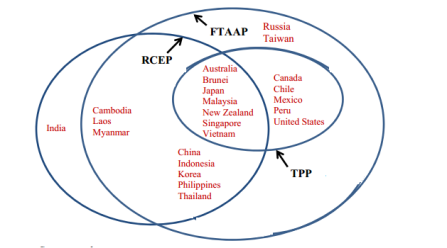APEC leaders agree to start FTAAP process
Asiatisch-pazifische Freihandelszone: FTAAP statt TPP?
baustellen-der-globalisierung
13. NOVEMBER 2014
EINGESTELLT VON RAINER FALK
 Einen geeigneteren Hintergrund als das diesjährige Treffen der Asiatisch-Pazifischen Wirtschafts-zusammenarbeit (APEC) in Peking hätte sich der Internationale Gewerkschaftbund (ITUC) kaum finden können für seinen
Einen geeigneteren Hintergrund als das diesjährige Treffen der Asiatisch-Pazifischen Wirtschafts-zusammenarbeit (APEC) in Peking hätte sich der Internationale Gewerkschaftbund (ITUC) kaum finden können für seinen
- Aufruf gegen die Verhandlungen über eine Transpazifische Partnerschaft (TPP). Die Regierungen sollten die Verhandlungen hierüber sofort einstellen „und sie nicht wieder aufnehmen, bevor sie ein wirkliches und transparentes öffentliches Mandat bei sich zu Hause erhalten, das die Interessen der Menschen ins Zentrum stellt“, heißt es in einer Erklärung vom 11. November. „Diese geheimnis-krämerische handelspolitische Abmachung wäre gut für einige multinationale Konzerne, aber zutiefst schädlich für die normalen Menschen und die ureigenste Rolle von Regierungen“, sagte die ITUC-Generalsekretärin Sharan Burrow im Namen der Gewerkschaftsverbände aus allen 12 TPP-Ländern.
TPP ist das asiatisch-pazifische Pendant zu TTIP, der sog. Transatlantischen Handels- und Investitions-partnerschaft, über die die USA und die EU verhandeln.
Wie TTIP würde TPP die Regierungen einem sog. Staat-Investor-Schiedssystem unterwerfen, über das Konzerne gegen politische Entscheidungen vorgehen könnten, die ihre aktuellen oder künftigen Gewinne beschneiden.
TPP würde eine Art von
- Patentschutz verbindlich machen, der die Profite der Pharmakonzerne stärkt und
- Medikamente für viele unbezahlbar macht; es würde die
- Politik der öffentlichen Auftragsvergabe und die Möglichkeiten zur Regulierung des Finanzsektors beeinträchtigen. Und:
Wie TTIP würde TPP
- nur die den USA wohlgesonnenen Länder einbeziehen,
- nicht aber aufstrebende Mächte wie China oder Indien.
Die US-Regierung mochte sich am Rande des APEC-Gipfels noch so sehr darum bemühen, die TPP-Verhandlungen zum Abschluss zu bringen; sie konnte nicht verhindern, dass die chinesischen Gastgeber ein inklusives Alternativ-projekt präsentierten, das alle Länder der Region einbezieht: die
- Free Trade Area of Asia Pacific (FTAAP). Dass der Gipfel die Bemühungen zur Errichtung einer FTAAP unterstützte, ist sicher als ein „historischer Schritt“ (so Chinas Staatschef Xi) anzusehen, auch wenn unklar ist, welche Gestalt eine solche größere Freihandelszone letztlich annehmen wird. Zusammen mit der Errichtung einer
- BRICS-Entwicklungsbank, einem
- BRICS-Währungsfonds, einer
- Asiatischen Infrastruktur-Investitionsbank (als Alternative zur Asiatischen Entwicklungsbank) und der
- geplanten Entwicklungsbank der Shanghai Cooperation Organisation ist dies eine weitere Facette in der Strategie, dem wirtschaftlichen Aufstieg eine alternative institutionelle Governance-Struktur folgen zu lassen – ganz nach der
- Devise: wenn und solange das nicht innerhalb der etablierten Organisationen geht, dann eben außerhalb!
TPP Trade Talks Must Stop – International Trade Union
Sharan Burrow, ITUC General Secretary, said “This secretive trade deal is good for some multinational corporations, but deeply damaging to ordinary people and the very role of governments. Corporate interests are at the negotiating table, but national parliaments and other democratic actors are being kept in the dark. What we do know, much of it through leaks, is that this proposed deal is not about ensuring better livelihoods for people, but about giving multinational companies a big boost to profits. Governments should shut down the negotiations, and not re-open them unless they get genuine and transparent public mandates at home that put people’s interest in the centre.”
The current TPP proposals include provisions which would:
![]() Make governments submit to so-called investor to state dispute settlement (ISDS) procedures whereby investors can sue governments on a wide range of policies, including environmental and social policies ;
Make governments submit to so-called investor to state dispute settlement (ISDS) procedures whereby investors can sue governments on a wide range of policies, including environmental and social policies ;
![]() Introduce patent protections that would boost pharmaceutical companies’ profits, but put vital medicines out of reach for millions of poorer people;
Introduce patent protections that would boost pharmaceutical companies’ profits, but put vital medicines out of reach for millions of poorer people;
![]() Severely restrict governments’ ability to make national laws for public health, safety and general welfare with a ‘regulatory coherence’ chapter;
Severely restrict governments’ ability to make national laws for public health, safety and general welfare with a ‘regulatory coherence’ chapter;
![]() Stop governments from giving priority to public policy aims when making decisions about public procurement;
Stop governments from giving priority to public policy aims when making decisions about public procurement;
![]() Impose a series of restrictions on governments’ abilities to regulate the financial sector, thus holding back efforts to reform damaging financial speculation and impeding governments from taking measures to maintain their balance of payment.
Impose a series of restrictions on governments’ abilities to regulate the financial sector, thus holding back efforts to reform damaging financial speculation and impeding governments from taking measures to maintain their balance of payment.
Proposals for protection of workers’ rights have met with heavy resistance from some countries, and appear to not cover all ILO Conventions that establish Fundamental Rights at Work or subnational (state and province) labour legislation. The proposals also contain no enforcement for environmental provisions, and fail to address the need for action to mitigate climate change.
“A fair and open global trading system is essential to prosperity, but this proposed TPP is nothing of the sort. Global and regional trade needs to create jobs and prosperity for the many, not just provide welfare for corporations and transfer more power from the parliaments to the boardroom,” said Burrow.
National trade union centers in the countries negotiating the TPP are today formally calling on their governments to stop the negotiations, and to seek a proper negotiation mandate if they are to engage in the negotiations again.
The national trade union centers that support this call are: Australia, ACTU; Canada, CLC, CSN and CSD; Japan, JTUC-RENGO; Mexico, UNT; New Zealand, NZCTU; Peru, CUT and CATP; United States, AFL-CIO. Some of these trade unions, as well as the unions of Chile (CUT-Chile) and Malaysia (MTUC) had asked for the negotiations to stop at an earlier stage.

